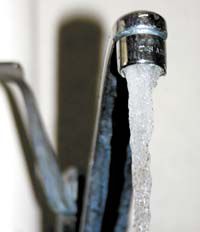| At the request of residents, Wellington officials are looking at alternative sources which may one day supplement or replace the city’s culinary supply currently provided by the Price River Water Improvement District. City officials have planned a study to review the feasibility of the matter. In January, Wellington applied for a $40,000 loan from the Utah Division of Drinking Water to cover the costs of the study. |
The Price River Water Improvement District clarified last week that it supports a request from Wellington to the Utah Division of Drinking Water to fund studying the feasibility of the city developing alternate water sources.
Karl Houskeeper, who is a board member for PRWID and mayor of Wellington, explained in a Feb. 6 district board meeting that city officials learned in a recent public hearing that the town’s residents support investigating different water resources.
Currently, Wellington is entirely dependent on PRWID for the city’s drinking water.
The city is looking at alternatives, including resources in the Coal Creek and Scofield watersheds.
To study the matter, the city has pursued a study to investigate the feasibility and cost of the city’s various alternatives.
In January, Houskeeper and other city officials met with the DDW board and requested a loan for $40,000 from the state to fund the study.
The current request to the state is for the water feasibility study.
If the city takes action based on the study and requests DDW funding, Wellington officials will need to apply separately for the money.
“The staff recommendation was, at that time, that they fund the project,” said Houskeeper.
The Wellington mayor added that DDW staff had several reservations, including the potential impact to PRWID.
If the project continues beyond a study and Wellington begins supplying all or part of the city’s culinary water, there could be a financial impact to the district.
And because PRWID receives drinking water division funding, there are concerns that, by providing revenues for Wellington’s project, the state would be competing against its own funds.
The DDW board tabled the matter until staff could obtain information regarding the impact to PRWID.
Houskeeper explained that he learned prior to the Feb. 6 board meeting that PRWID staff had been contacted and had responded.
“Even though the majority of the comments in that response I agree with, there are some comments in there that are inflammatory,” said the Wellington mayor.
Houskeeper further explained that he had intended to approach the water improvement district board and request that PRWID support Wellington’s state funding request.
But before the mayor could meet with the district board, PRWID staff had reportedly responded in a manner which could negatively impact Wellington’s funding request.
Houskeeper added that the feasibility study and the repayment of the loan will not affect the water improvement district, although future actions resulting from the study could impact PRWID.
“For this district to take the approach to try to thwart this before it even starts is totally uncalled for and I am quite concerned with that,” commented Houskeeper.
Because the state drinking water staff was scheduled to meet the next day, the Wellington mayor requested that the PRWID board draft a letter of support and fax it to DDW prior to the state agency’s meeting.
Phil Palmer, PRWID’s manager, indicated that water improvement district staff had responded as quickly as possible and he did not think the matter warranted board oversight.
“All we did was respond to their questions,” pointed out Palmer.
However, Houskeeper said PRWID’s response included statements regarding areas which the district has no knowledge.
In particular, the Wellington mayor said the district’s response contained comments regarding areas over which PRWID and its staff have no knowledge, such as the budgetary process in Helper.
Acting on the request, the district drafted a letter of support and sent it to the Utah Division of Drinking Water.
Houskeeper said on Wednesday that Wellington has not heard further information from the state agency.
The next DDW board meeting is scheduled for March 2, where state officials are expected to hear a report from staff regarding the matter and may make a decision regarding Wellington’s funding request at that time, pointed out Houskeeper.

